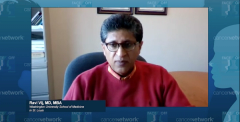
Ongoing Trials Aim to Determine Best Regimen for Transplant-Ineligible Patients With Myeloma
Luciano J. Costa, MD, PhD, discussed additional studies evaluating various treatment regimens for transplant-ineligible patients with newly diagnosed multiple myeloma, aiming to determine the best standard in this population.
Episodes in this series

As part of CancerNetwork’s Face-Off video series, Luciano J. Costa, MD, PhD, professor of medicine - hematology and oncology, Department of Medicine, University of Alabama at Birmingham, discussed additional studies evaluating various treatment regimens for transplant-ineligible patients with newly diagnosed multiple myeloma, in particular, those who are older and more frail.
Costa: So there are several follow-up studies from the MAIA trial [NCT02252172]. One that was presented at [the 2022 American Society of Hematology Annual Meeting and Exposition] is an IFM study done by the French group that compared lenalidomide [Revlimid] and dexamethasone, so the same standard that was in the MAIA [trial], with daratumumab [Darzalex] and lenalidomide, so that is a steroid-free regimen in patients who are frail, so not just non-transplant eligible, but non-transplant eligible with a high frailty score, which is really a difficult population that's usually underrepresented in clinical trials.
And that study showed, again, a substantial improvement in progression free survival for patients with [daratumumab plus] lenalidomide, without dexamethasone outside the initial cycles where dexamethasone is used for premedication prior to daratumumab. So that helps to generate things for this more frail population, and gives the message that perhaps those patients don't need as much steroid. We know [steroids are] a big contributor of toxicity.
Another study that I'm watching with some interest is coming from the US Intergroup study led by SWOG that will compare the MAIA regimen of D-Rd with the SWOG-S0777 trial [NCT00644228] regimen of bortezomib [Velcade], [lenalidomide and dexamethasone], which had been the prior standard in the United States. And this study is meant to be a very large study and include patients who have traditionally not been included in many clinical trials, including patients with substantial organ dysfunction, poor renal function, and so forth. So this should be a very informative trial that, if successful, will provide evidence that should be very applicable for the majority of those patients and try to finally answer which one of those regimens is in fact the best one.
Transcription edited for clarity.
Newsletter
Stay up to date on recent advances in the multidisciplinary approach to cancer.








































